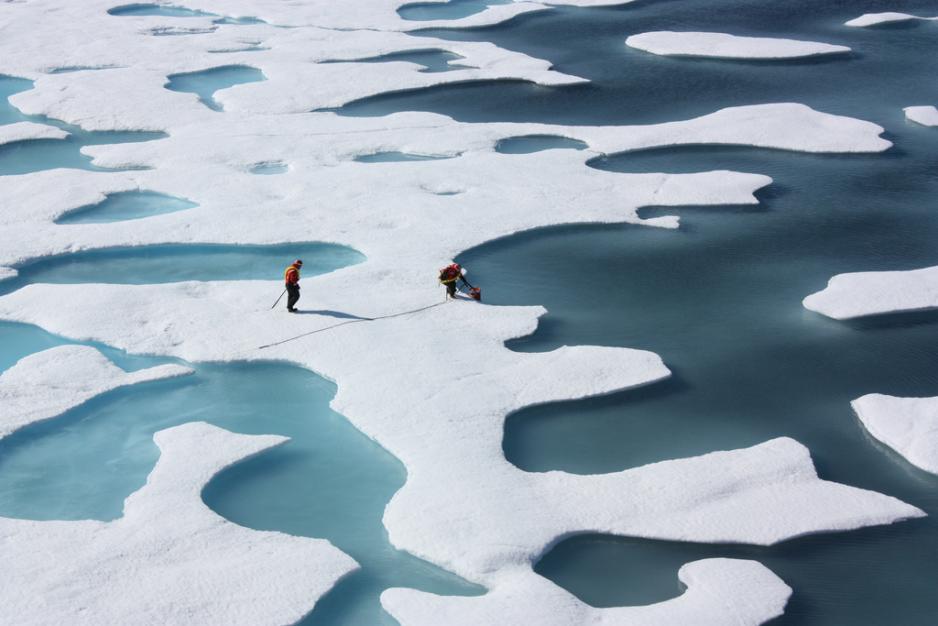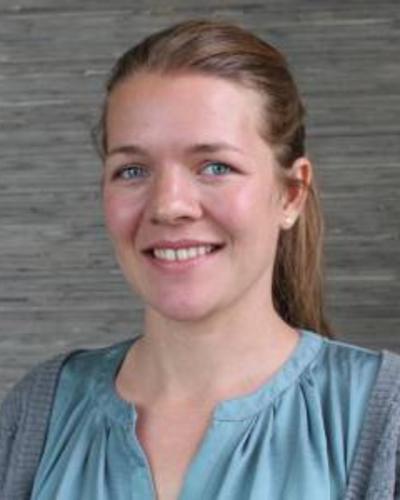Web Portal on Arctic Climate Science Bridges Education Gap

Researchers on the NASA-funded ICESCAPE mission examining melt ponds. Credit: NASA Goddard Space Flight Center
"I find it fascinating that you can use the mathematics and physics to explain what is going on with ice sheets and how the climate is changing", says Anne-Katrine Faber, the web portal’s project leader.
The Norwegian web portal ‘IGLO – Build your own teaching about the Arctic’ bridges the gap between Arctic climate scientists and educators, supported by the Research Council of Norway.
As it was presented in April at the annual meeting of the European Geophysical Union (EGU) in Vienna, Austria, the audience affirmed that IGLO’s approach is much needed.
Anne-Katrine Faber, the web portal’s project leader, explained to HNN that the IGLO website acts as a sorting mechanism for material on the Arctic climate that can be used for teaching: "We want to make sure that the newest knowledge in terms of Arctic climate change is being put out there so that educators and teachers can pick up on this and create teaching based on that."
Focus on the Arctic
One of the reasons for the website’s focus on the Arctic is the different reactions to Faber’s studies in physics and later her Arctic research. She recounts: "I’ve been working as a polar scientist for several years now and people get really interested when they hear that I work in the Arctic. People say: ‘Oh, it sounds so exciting! Tell me more about it!"
We want to make sure that the newest knowledge in terms of Arctic climate change is being put out there
When she was studying, her friends often did not understand why she studied physics and what career options she had afterwards. "But as soon as you use physics for polar science, the interest is completely different."
Therefore, IGLO embraces Arctic climate science as a focal point: "We can use polar science as a focus to communicate how climate scientists work."
Climate change strengthens interest
The focus on the Arctic is also crucial due to the climatic changes that have been witnessed over the past years. Faber points to some of the trends: "The sea ice is declining, Svalbard is getting warmer and the Greenland ice sheet is losing more mass."
"And with that suddenly there is an interest from the students and the teachers that they want to learn more about the Arctic. There is a much higher pull from the students and teachers themselves," she adds.
Science not only for scientists
Faber also stresses the importance of facilitating the general public’s and decision-makers’ understanding of climate science: "It’s important to know how the science works, what we know about climate changes and how we know this is true, so that people know what we say about climate change is based on real science. And by creating awareness of how scientists work, I hope this can contribute to a better understanding."

The focus on the Arctic is also crucial due to the climatic changes that have been witnessed over the past years. Anne-Katrine Faber points to some of the trends: “The sea ice is declining, Svalbard is getting warmer and the Greenland ice sheet is losing more mass”. Credit: UiB
"Science is for everyone, not just researchers. Therefore, it is important that the newest information is communicated in a clear way. This is important, because if we fail to do so, then it might not reach the people that need to make the decisions for the future."
Giving young researchers a voice
IGLO gives young researchers an opportunity for outreach and connects them to education. "We make young scientists take over our Instagram account and then post stories about their research and what they do. For many, it’s the first time that they communicated the research that they do as PhD students and they get instant feedback with likes."
The response from the young researchers was overwhelmingly positive, suggesting that more similar programs for early career scientists could be beneficial.
The fun side of science
Faber also attaches great importance to show that it’s fun to be polar scientist. "Polar science for most of my colleagues and me is a really good way to use the science that we’ve learnt in school and to apply it to a real-world issue."
"There is science in everything that we do. I find it fascinating that you can use the mathematics and physics to explain what is going on with ice sheets and how the climate is changing. Science is exciting and useful!" she concludes.
